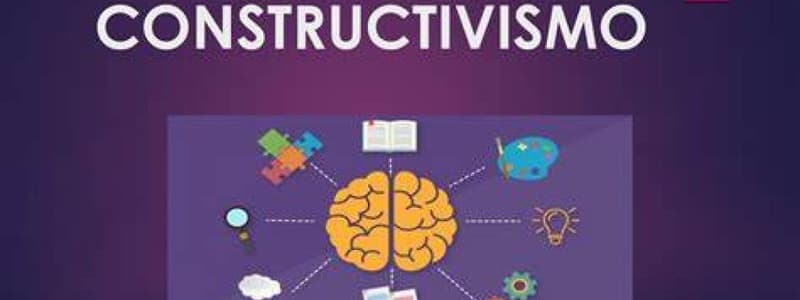Podcast
Questions and Answers
¿Cuál es el principio fundamental en el que se basa el enfoque pedagógico constructivista?
¿Cuál es el principio fundamental en el que se basa el enfoque pedagógico constructivista?
- Los estudiantes no deben participar activamente en su educación.
- El aprendizaje debe ser individual y sin interacción con otros estudiantes.
- Los maestros deben ser la única fuente de conocimiento para los estudiantes.
- Los estudiantes deben aprender de diferentes maestros y fuentes para crear una comprensión única. (correct)
¿Qué método educativo se utiliza para desarrollar un entorno constructivista exitoso?
¿Qué método educativo se utiliza para desarrollar un entorno constructivista exitoso?
- Aprendizaje tradicional basado en la memorización
- Enseñanza directa sin interacción
- Aprendizaje colaborativo (correct)
- Aprendizaje competitivo entre los estudiantes
¿En qué entorno ha demostrado ser efectivo el aprendizaje colaborativo según el texto?
¿En qué entorno ha demostrado ser efectivo el aprendizaje colaborativo según el texto?
- Entornos de aprendizaje individual
- Entornos de tecnología de la construcción (correct)
- Entornos de enseñanza tradicional
- Entornos competitivos entre estudiantes
¿Qué ventajas puede proporcionar el aprendizaje colaborativo a los estudiantes?
¿Qué ventajas puede proporcionar el aprendizaje colaborativo a los estudiantes?
¿Cuál es uno de los objetivos principales del enfoque pedagógico constructivista?
¿Cuál es uno de los objetivos principales del enfoque pedagógico constructivista?
Study Notes
Constructivism-Pedagogy: A Student-Centered and Collaborative Learning Approach
Constructivism is a learning theory that emphasizes the active involvement of students in the learning process, focusing on their experiences, prior knowledge, and interactions with their peers and teachers. This approach to education has led to the development of pedagogical strategies that prioritize student-centered and collaborative learning environments.
Student-Centered Learning
Student-centered pedagogy is defined as an instructional approach in which students influence the content, activities, materials, and pace of their learning. It is based on the constructivist approach, which views teaching as "scaffolding" provided by adults or more capable peers, with the goal of assisting learners to become more skilled at managing their own learning. In this approach, teachers act as facilitators and encourage students to co-construct knowledge with their peers and teachers.
Student-centered teaching methods include multisensory approaches, active participant structures, communal note-taking, student learning communities, long-term memory strategies, knowledge organization strategies, breaking down content into small pieces, and informal/formative assessment. These methods are designed to engage students in the learning process and allow them to take ownership of their education.
Collaborative Learning
Collaborative learning is a key aspect of constructivist-pedagogy. It involves students working together to construct knowledge and learn from one another. This approach is based on the principle that students can learn from different teachers and sources to create a unique understanding. Integrative teaching methods such as project-based learning, problem-based learning, scaffold learning, and flipped learning are used to develop a successful constructivist environment.
Collaborative learning has been shown to be effective in various settings, including construction technology, where it can enhance student engagement and learning outcomes. It also has the potential to overcome difficulties students may face in the learning process, such as time limitations, knowledge complexity, and lack of enthusiasm.
Conclusion
Constructivism-pedagogy is a student-centered and collaborative learning approach that prioritizes the active involvement of students in their education. This approach emphasizes the importance of trusting relationships between teachers and students, making abstract concepts concrete and meaningful, and using a variety of teaching methods to cater to different learning styles. By fostering a collaborative learning environment, constructivist-pedagogy encourages students to co-construct knowledge and take ownership of their learning, ultimately leading to better educational outcomes.
Studying That Suits You
Use AI to generate personalized quizzes and flashcards to suit your learning preferences.
Description
Exploraremos los principios de el constructivismo y veremos cuanto sabemos de ello.




